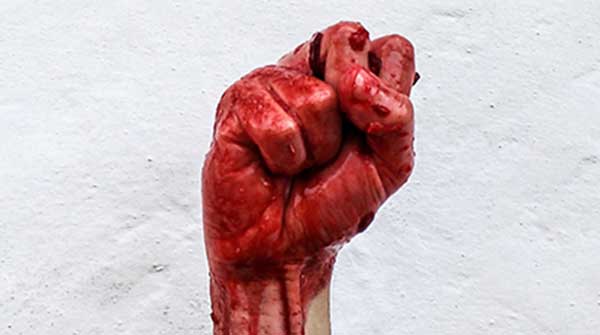Focusing solely on Hamas while ignoring the presence of Islamic antisemitism among Palestinians is short-sighted
 On Saturday, Oct. 7, Gaza Strip terrorists conducted unspeakable horrors, blatant war crimes, and crimes against humanity against Israeli civilians.
On Saturday, Oct. 7, Gaza Strip terrorists conducted unspeakable horrors, blatant war crimes, and crimes against humanity against Israeli civilians.
Since the first news of this bloodthirsty invasion of Israel was announced, the media has repeatedly described it as a battle between Israel and Hamas while maintaining that ordinary Palestinians had little or no role to play in the massacre.
Hamas’s 1998 Charter rejected a two-state solution – one for the Palestinians and one for the Israelis – instead calling for Palestinian armed resistance to end the Israeli occupation and replace it with an Islamic state over the combined territory of Israel, the West Bank, and the Gaza Strip. To do so, it has pursued a policy of almost non-stop jihad (armed struggle) against Israel.
The Charter directs the killing of Jews, drawing on a hadith (prophetic saying): “The Day of Judgment will not come about until Muslims fight Jews and kill them. Then, the Jews will hide behind rocks and trees, and the rocks and trees will cry out: ‘O Moslem, there is a Jew hiding behind me, come and kill him.’”
The revised 2017 Charter states that “The liberation of Palestine is the duty of the Palestinian people …. Resisting the occupation with all means and methods is a legitimate right guaranteed by divine laws and by international norms and laws.”
The Oct. 7 massacre was only the latest expression of these articles.
Accordingly, focusing solely on Hamas’s evil to the exclusion of Islamic antisemitism, as expressed in these Charters, is perversely short-sighted.
That establishment of Hamas was accepted by Palestinians as “the best thing that happened to the Palestinian people since 1948” was revealed in a public opinion poll published in mid-June 2023 showing support for the two-state solution to be very low: approval stood at 28 percent, and opposition at 70 percent.
A large majority (71 percent) expressed support for the formation of armed groups. More than 85 percent of the respondents said the Palestinian Authority (PA) ruling the West Bank does not have the right to arrest members of armed groups to prevent them from carrying out attacks against Israel.
US Secretary of State Antony Blinken, on a visit to Israel on Thursday, Oct. 12, 2023, opined that the Palestinians have “legitimate aspirations” not represented by the militant group Hamas and that “We know Hamas doesn’t represent the Palestinian people.”
The reaction of Gaza and West Banks residents and their supporters worldwide and the above polling results suggest Blinken’s words are rhetorical rubbish.
First, the two Hamas Charters claim, “Palestine is the spirit of the Ummah and its central cause; it is the soul of humanity and its living conscience …. Palestine is at the heart of the Arab and Islamic Ummah and enjoys a special status,” showing that the battle is ultimately one between the Jewish people and Moslem Arabs.
Second, of the 10 conflicts termed wars by the Israeli Ministry of Defense since statehood in 1948, only the last five have been against a Hamas-lead collectivity of Palestinian Arabs. The dozens of other wars and armed conflicts, many preceding 1948, involved confrontations between Israeli settlers and citizens and militias or armies from one or more of the following Muslim countries or organizations: Egypt, Jordan, Syria, Lebanon, Yemen, Saudi Arabia, Iraq, Algeria, Morocco, the Palestinian Liberation Organization (PLO), Hezbollah, and others.
The common denominator in all these wars and conflicts was widespread popular opposition to a large and influential Jewish presence in the Middle East based on a combination of the widespread belief that Jews have a flimsy claim to a homeland in the Middle East and European-inspired antisemitism.
The Koran, a book with equivocal and contradictory views about Jews and Judaism, nevertheless contains many blatantly antisemitic passages such as: “The punishment of those who wage war against Allah and His apostle and strive to make mischief in the land is only this, that they should be murdered or crucified or their hands and their feet should be cut off on opposite sides or they should be imprisoned; this shall be as a disgrace for them in this world, and in the hereafter they shall have a grievous chastisement” (Chapter 5.33).
In 2014 the Anti-Defamation League published a global survey of worldwide antisemitic attitudes, reporting that, in the Middle East, 74 percent of adults agreed with a majority of the survey’s 11 antisemitic propositions, including that “Jews have too much power in international financial markets” and that “Jews are responsible for most of the world’s wars,” propositions straight out of Nazi and Hamas propaganda.
These hateful, even murderous, Palestinian beliefs and practices mean that the Palestinian people have blood on their hands when it comes to supporting the indiscriminate killing of Jews whenever their genocidal leaders have decided to do so.
Hymie Rubenstein is editor of REAL Indigenous Report and a retired professor of anthropology at the University of Manitoba.
For interview requests, click here.
The opinions expressed by our columnists and contributors are theirs alone and do not inherently or expressly reflect the views of our publication.
© Troy Media
Troy Media is an editorial content provider to media outlets and its own hosted community news outlets across Canada.


